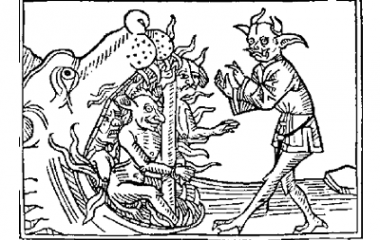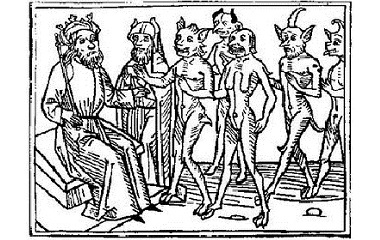A powerful demon existed before Satan and pandered to the needs of the perverts, atheists, the worthless, occultists, or anyone with a disturbed soul. According to the ancient Dead Sea Scrolls, Belial, or the King of Evil, was responsible for bringing wickedness to man.
Who Is Belial?
Belial, also referred to as Beliar, is a demon. The word means worthless in Hebrew, and later came to represent the personification of the devil. In the Old Testament of the bible the word tends to be used to describe a class of people, for instance the sons of Belial. The New Testament introduces Satan as the ruler of evil, but prior to that, Belial was said to be his predecessor. In demonology, he is one of Satan’s most notable demons sources recount.
Sources
The term appears 27 times in the Masoretic Text, an authoritative Hebrew and Aramaic text. The word is used, in a Hebrew context, to describe many debase concepts or persons such as those who support or encourage the worship of other gods, those who have committed sex crimes, or rabble-rousers.
In the Dead Sea Scrolls, the Angel of Light and the Angel of Darkness are mentioned. God is cited as the Angel of Light, and Belial the contrary. The demon was said to bring guilt and wickedness to man. The source also recounts a dream of Amram, the father of Moses, where Belial is described as the King of Evil or Prince of Darkness. The Fragments of a Zadokite Work, texts contained within the Dead Sea Scrolls, speak of the three nets of Belial: fornication, wealth and pollution of the sanctuary. He is depicted as a rebel or an agent of divine punishment and is said to be the one who influenced the Egyptian sorcerers to oppose Moses. This text also classifies any of his followers as necromancers or wizards!
The Testament of the Twelve Patriarchs, one of the hidden scriptures linked to the Old Testament, depicts the demon as God’s adversary and places him in the role of the tempter. The texts cite that fornication brings man closer to Belial and separates him from God. It also claims that when the soul is disturbed, it is Belial ruling over it. When Egypt leaves Israel, Belial will remain with the Egyptians in darkness, the document further asserts. It also supports the view that the messiah will punish the demon and his followers on his return. Another apocryphal (hidden) text depicts him as the angel of lawlessness and the actual ruler of Earth.
The demon is also mentioned in John Milton’s Paradise Lost and Robert Browning’s Soliloquy of the Spanish Cloister; both poets were considered freethinkers in their respective times.
Occult References
Various occult texts refer to Belial, including the 17th century grimoire The Lesser Key of Solomon, Aleister Cowley’s Goetia, and the Satanic Bible.
In the Goetia, Belial is introduced as king of the demons and created second only to Lucifer. He is said to bring favors to magicians and appears as two angels standing in a chariot of fire. In the Pseudomonarchia Daemonum, he is listed as one of the top demons. He is described in the text as the seducer of all the fallen angels. He is also illustrated as being extremely deceitful and only offers truth if threatened.
Edgar Cayce, a Christian psychic and mystic, used the term sons of Belial in his deep trance reading sessions in 1937. He was popularly known as the sleeping prophet and gave over 2500 readings to those he induced a deep trance state in. He used the term in the Hebrew sense of worthlessness, but later used it to refer to opposing human forces.
Fifteen century noble Gilles de Rais was said to dabble in alchemy and the occult. Sources claim de Rais attempted to call on the demon using the body parts of his victims, possibly numbering in the hundreds, as a sacrifice. The Frenchman was branded a serial killer and put to death.
Modern References
Belial, furthermore, continues to appear in many modern books (Dean R Koontz’s Phantoms and Graham Masterson’s Master of Lies), films (Nosferatu, The Exorcism of Emily Rose and Basket Case) and games (Vampire: the Requiem, Diablo etc.).
Belial is associated with the immoral, atheists, magicians, or perhaps anyone going against the grain, it seems. In today’s modern society, however, does the majority not tend towards aberration and diversion, in some form, from the status quo? Does the tendency to be self-aware and question previously accepted dogma make us all sons and daughters of Belial?











So, he’s a weirdness demon?
Worshipping those who did sex crimes is more than weird…did you read it?